Tools and Techniques in Social Research
Introduction
Research within social sciences is deemed as a procedure that enquires into issues which are social in nature and social challenges that are known to exist within any given society. New knowledge is being gained with the help of research into social sciences and thereby, novel information is being acquired via scientific as well as systematic processes [1]. Social science research would refer to a step-by-step method of acquiring new information on any social topic that makes an impact on people within society. Research in social sciences provides new insights into social occurrences which enables researchers to get an idea of why, when, where, what and how social life is being developed and redeveloped on a day-to-day basis. On the basis of social science research the intricate manner of society is being comprehended as research in social sciences offers awareness for displacement or sustenance of realities that are preconceived [1]. Social science research is a strategic procedure that has been deployed by researchers to challenge current knowledge, on the basis of new findings that displace previous knowledge on social reality.
In the current day, social science research would pertain to either an applied or pure kind of research that offers valuable insights on social happenings or issues in any society. The focus of social research is on social aspects of human existence and the diverse nature of social reality [2]. Social research is deemed as a blend of ‘social and ‘research’. Therefore, social research would simply refer to research on social life and social issues.
Tools and Techniques for Social Research
The basic challenge with master in social science research techniques would be the terms that are utilized to communicate concepts that are esoteric in nature [3]. While discussing methods in social science research, there is a need to decide the manner in which information can be gathered in a manner that is valid scientifically. Information can be collected through several ways; nonetheless, there is a limited number of ways to scientifically execute it. The spirit of social science research can be narrowed down to a single word; empiricism or being empirical. This would mean something that can be observed through senses [4]. Empirical tools to gather information would primarily be of six types and these would include;
- Surveys
- Interviews
- Focus Groups
- Field Observation
- Experimentation
- Existing Data
However, gathering information through the above techniques warrants the need to develop questionnaires for social science research.

Questionnaire Development
Designing a questionnaire for a social research survey is not easy. A questionnaire is referred to as a tool for amassing data wherein a respondent (person who answers the questions) offers answers to an array of questions [5]. Questionnaire development for gathering data would require time and efforts. Nonetheless, by adopting steps of tool development in research for questionnaire development, you would be in a position to come up with effective mediums to gather data that will be helpful to you in terms of answering your research questions [6]. Adopting a step-by-step approach would be the best way to develop a questionnaire. The steps are outlined as under.
Step One – Determining the Objective
- Identifying the objective of the questionnaire. You need to decide on the kind of information that you are desirous of gathering with the questionnaire.
- Develop a research question. It could be one or more nonetheless; it will form the crux of the questionnaire.
- Develop hypotheses that will be tested using the questionnaire.
Step Two – Determining the Types of Questions
On the basis of the information accumulated, there would be many kinds of questions that could be added within the questionnaire, wherein, each would have their own advantages and disadvantages. Some of the commonly used questions within a questionnaire would be; dichotomous questions, open-ended questions, multiple choice questions, rank order questions and rating scale questions.
Step Three – Developing Questions
Questions within the questionnaire are supposed to be concise, clear and direct. This will be helpful in ensuring that you derive the most appropriate answers whileconducting your social science research. However, the questions are supposed to be short and simple. Complicated statements or jargon need to be avoided.
Step Four – Questionnaire Length
Keep the questionnaire as short as it can be possible because a large number of respondents would be open to answer questionnaires that are short. Also refrain from asking unwanted questions and stick only to questions that are necessary for the research.
Step Five – Writing the Questionnaire
It is necessary that you give an introduction of the person who will be conducting the survey. It is the onus of the interrogator to state whether he is working alone or as a group. Further, the purpose of the research / questionnaire should also be mentioned so that the respondent is aware how the data gathered from him will be used.
Conclusion
Questionnaire development for social research can be tedious, taxing and rigorous. A weak questionnaire would mean that it would impact the quality of your research. Therefore, utmost care has to be taken during questionnaire development. To make things easy, you can avail questionnaire and survey development help that is offered by professionals.
References
[1] B. Fecher and M. Hebing, “How do researchers approach societal impact?,” PLoS One, vol. 16, no. 7, p. e0254006, Jul. 2021, doi: 10.1371/journal.pone.0254006.
[2] Akinmayowa Lawal, Understanding Social Science Research: an Overview. 2019.
[3] P. Dongare et al., “Development and validation of a questionnaire for a survey on perioperative fasting practices in India,” Indian J. Anaesth., vol. 63, no. 5, p. 394, 2019, doi: 10.4103/ija.IJA_118_19.
[4] H. Lahmami, “Methodology of social science research, the case of the sociology of action in relation to values,” Rev. Electrónica Interuniv. Form. del Profr., vol. 23, no. 1, Dec. 2019, doi: 10.6018/reifop.404931.
[5] Syed Muhammad Sajjad Kabir, Preparing Questionnaire. 2016.
[6] S. Yaddanapudi and L. Yaddanapudi, “How to design a questionnaire,” Indian J. Anaesth., vol. 63, no. 5, p. 335, 2019, doi: 10.4103/ija.IJA_334_19.

 Previous Post
Previous Post Next Post
Next Post